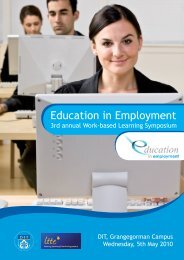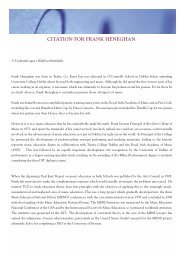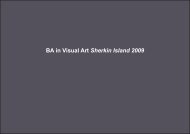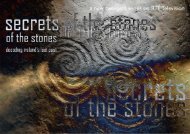TWICE THE SIZE - DIT Update - Dublin Institute of Technology
TWICE THE SIZE - DIT Update - Dublin Institute of Technology
TWICE THE SIZE - DIT Update - Dublin Institute of Technology
Create successful ePaper yourself
Turn your PDF publications into a flip-book with our unique Google optimized e-Paper software.
palpable shift in Cork from the “wired world” to the “conceptual age” <strong>of</strong> words, music and art,<br />
which some might say occurred in retaliation against the insidious web-styles permeating almost<br />
every other aspect <strong>of</strong> life. Building on past projects such as the European Capital <strong>of</strong> Culture in<br />
2005, Cork successfully harnessed its creative resources throughout the late 2010s and 2020s.<br />
During this period, tourism became one <strong>of</strong> the city’s most important sources <strong>of</strong> inward<br />
investment, with significant increases in airport passenger volume. Cork City Council was partly<br />
credited with the surge in tourism for its role in increasing the number and quality <strong>of</strong> Areas <strong>of</strong><br />
Special Character (ASC) and Protected Structures in the city, as well as making major<br />
streetscape improvements with the provision <strong>of</strong> walking and cycling tour routes along the docks<br />
and throughout the old city quarter. Cork was named Europe’s number one city break<br />
destination in 2013, and, in 2016, it was given the prestigious “Eco-Trail Destination <strong>of</strong> the<br />
Year” award. The opening <strong>of</strong> the Spike Island Heritage Centre in 2015 further boosted local<br />
tourism. However, Cork’s Slow Food Movement was also accorded due credit for instigating an<br />
increase in tourist numbers to both Cork city and county. With the rise <strong>of</strong> ethical consumerism<br />
at a time <strong>of</strong> deepening eco-anxiety, Cork North West capitalized on the growing niche market <strong>of</strong><br />
the new demographic known as “ethical eaters”.<br />
Society and <strong>Technology</strong><br />
Building a livable city became a central tenet <strong>of</strong> city planning and development in Cork during<br />
the 2020s. To some extent, this was achieved with Cork coming second on the 2018 City<br />
Happiness Index (CHI) list, which measured the three most important drivers <strong>of</strong> national<br />
happiness: health, wealth and education. However, an undercurrent <strong>of</strong> social unrest is<br />
increasingly felt within Cork, and there are growing fears that a social crisis looms. Social<br />
dynamics at the local level have given rise to public concern as a shift from former patterns <strong>of</strong><br />
community identity towards individual identity has taken place. Nationalisms and ethnicities are<br />
pulling people apart in the city, and ethnic communities are increasingly being polarized and<br />
segmented in the workplace, in education, and in networks and norms, thereby rendering Cork a<br />
socially divided city with growing disparity levels between the ‘haves’ and ‘have nots’. Although<br />
156<br />
Having gained a worldwide<br />
reputation as a number one<br />
producer <strong>of</strong> added value, quality,<br />
organically grown food and<br />
humanely raised meat and<br />
poultry, perhaps Cork’s future<br />
competitive edge will be largely<br />
reliant on the surrounding towns<br />
<strong>of</strong> Charleville, Kanturk and<br />
Coachford to cater for the<br />
emerging appetites <strong>of</strong> the “moral<br />
economy”.








